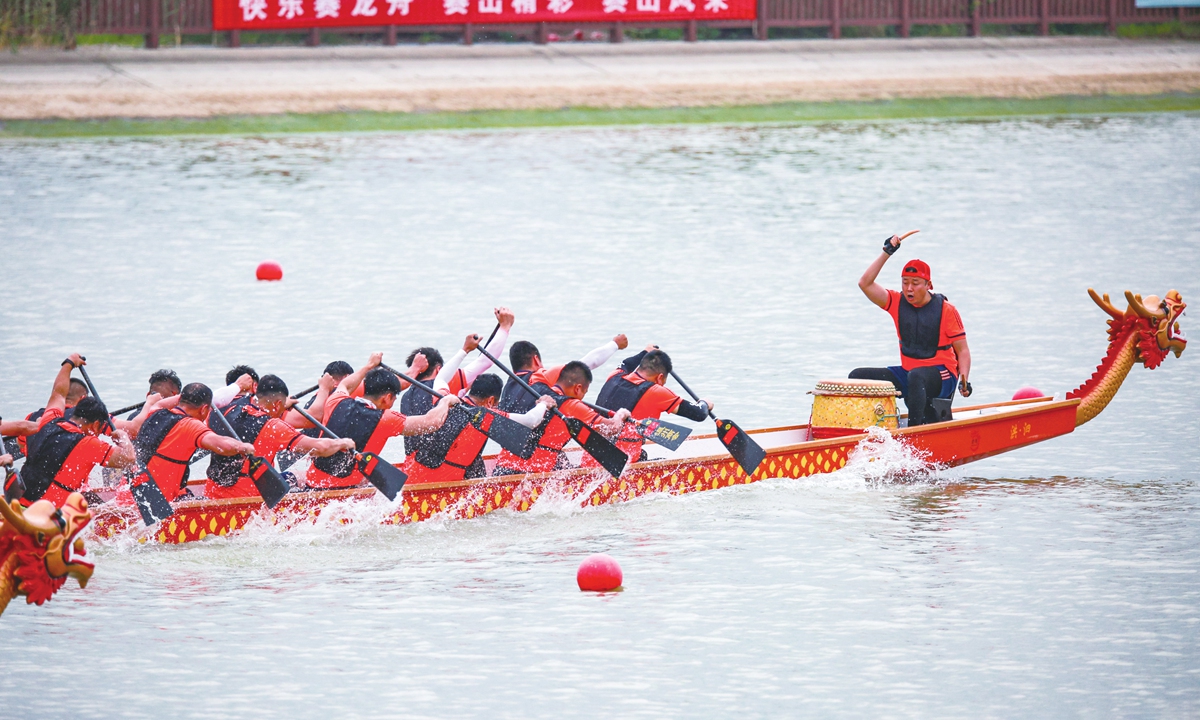
“Boom, boom, one, two, boom, boom, one, two…” As the Dragon Boat Festival approaches, the waters of many rivers and creeks in South China’s Guangdong Province have once again come alive with the sounds of drumming and cheering after the epidemic, as dragon boat teams train and compete by vigorously rowing across the sparkling water one after another.

Zongzi, a traditional snack eaten during the Dragon Boat Festival.
For over 2,000 years, the traditional Chinese festival that falls on the fifth day of the fifth month of the Chinese lunar calendar has been a holiday for all ethnic groups in China to commemorate customs and traditions such as eating zongzi, a traditional dish made of glutinous rice wrapped in bamboo leaves, to commemorate ancient China’s patriotic poet Qu Yuan, hanging mugwort leaves, drinking realgar wine for warding off disasters and evil spirits and holding dragon worship ceremonies and events like dragon boat racing. Among them, the most lively and iconic is undoubtedly the dragon boat racing.
Chinese experts told the Global Times that the Dragon Boat Festival not only carries the cultural heritage of the Chinese nation but also promotes the spirit of teamwork and unity. The dragon boat racing, in particular, emphasizes the importance of communication, cooperation and mutual support among team members.
Hometown of the dragon boat
Known as the “hometown of the dragon boat,” by 2023 Guangdong Province has held an impressive number of 229 dragon boat races, ranging from events of county to international level, according to the sports department of Guangdong Province.
Dragon boat racing is often powered by a team of 10 to 50 paddlers on a very long and narrow boat decorated with a Chinese dragon head and tail. It also involves using a large drum onboard that helps the crew keep pace as they paddle.
In Guangdong provincial capital Guangzhou, many competitions are organized at village level, only villagers are allowed to participate, regardless of age or gender.
The term “villager” is synonymous with “property owner” in Guangzhou, where urban renewal has led to an increase in property values, making many locals millionaires overnight. While some have taken advantage of this wealth by owning multiple properties and becoming landlords, they still take time to train for the annual dragon boat race which usually costs 1 to 2 million yuan.
Some netizens call the dragon boat race “Guangzhou landlord competition,” jokingly saying that “if a traditional dragon boat is filled with 70 landlords, the total property worth will exceed 2 billion yuan.”
Some netizens also humorously muse about the possibility of the losing team “being punished by kneeling down in their villagers’ ancestral hall.”
Luo, a 28-year-old local from Foshan city, Guangdong Province, told the Global Times on Tuesday that the online comments are an exaggeration.
“It is indeed our strong economy that has driven the spread of dragon boat culture. For many villages in Guangdong, dragon boat racing is a significant tradition, and participating in the race is a way to showcase our community’s strength and unity,” he said.
Despite the financial gains associated with being a dragon boat champion, these athletes claim that their motivation comes from a more profound sense of cultural pride.
He said that the annual dragon boat activities are an indispensable tradition and ritual for the Guangdong people. Meanwhile, the race deepens communication between villages.
Racing around the world
Besides Guangzhou, dragon boat racing is being held in many other cities across China and even in other parts of the world, including the US, UK and Australia, as many overseas Chinese communities have been organizing related events.
These range from amateur races like those held in the provinces of Sichuan and Hunan, where the sport is popular, to professional races such as the China Longzhou (Dragon Boat) Tournament, which is scheduled to be held from Tuesday to Thursday in Fuzhou in East China’s Fujian Province.
He Yi, secretary-general of the Chinese Dragon Boat Association, told the Global Times that the resumption of dragon boat races in China after a three-year pandemic hiatus is vital in celebrating this year’s Dragon Boat Festival.
He also noted that the participation of university teams in professional dragon boat races underlines China’s deep talent pool in the sport.
A university dragon boat race was held in Kunming, Southwest China’s Yunnan Province from Friday to Sunday, attracting participants from countries such as Vietnam, Kazakhstan, Pakistan and Panama, Sun Hongkun, a vice sports chief in Kunming, told the Global Times.
“With the participation of international teams, the event was the biggest dragon boat race ever held in Kunming,” Sun said.
“We have also established a dragon boat race on land to engage with more audiences.”
The land dragon boat race sees participants use wooden sticks instead of paddles and the boats have wheels. This has become a popular variant for people who want to experience a real dragon boat race without worrying about falling into the water.
The two experts both noted that dragon boat racing highlights Chinese values and the spirit of teamwork and unity, thus becoming a Chinese culture symbol around the globe that is helping spread the nation’s traditional culture worldwide.
Whether it’s through the sound of drumming, the cheers of competitors, or the sight of boats worth millions of dollars, the dragon boat culture is a tribute to China’s rich history and a testament to Chinese people’s strength and resilience.
By Globaltimes.cn




COMMENTS